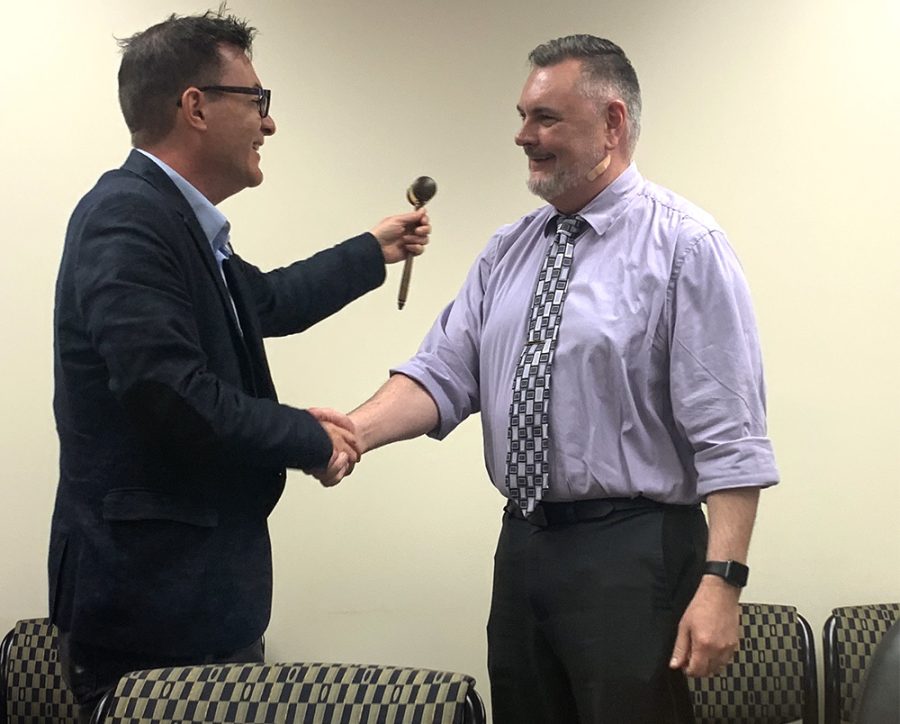Faculty Senate confirms CASL suspension
Faculty Senate member C.C. Wharram (left) accepts the gavel from Todd Bruns, the 2019 Faculty Senate chair, on May 2 during the Senate meeting at Booth Library. Wharram will be the next chair for the Senate starting in the fall.
May 13, 2019
Eastern’s Provost Jay Gatrell said the Academic Affairs office is suspending the University Committee for the Assessment of Student Learning (CASL) for the next year in order to have a discussion surrounding assessment on campus and what can be changed about it.
“If we truly believe in assessment as a process part of that is also reflecting on our prior (assessment) practices,” Gatrell said. “Is it working; is it making sense?”
Gatrell made the announcement during the final Faculty Senate meeting on May 2.
The vice president for academic affairs (before Gatrell) established CASL to develop and oversee university-wide policies and plans on the assessment of student learning, according to the “Plan for the Assessment for Student Learning,” which was last updated in 2014.
According to the document, assessment in the academic setting refers to the evaluation of learning “at the program level as distinguished from evaluation of individual students.”
Therefore, assessment of student learning is the “process to improve the knowledge, skills and attitudes acquired through study and practice.”
“Through the assessment process, academic programs compare student learning objectives (desired learning) to learning outcomes (what actually was learned) and use the information generated by these comparisons to make programmatic changes,” according to the “Plan for the Assessment for Student Learning.”
Assessment is conducted at two levels—the university level and the department level.
At the university level, assessment is conducted to evaluate students’ achievement of university-wide learning goals for undergraduates and graduates. At the department level, assessment is conducted to evaluate students’ achievement of the learning goals of the academic programs.
The plan developed by CASL outlines Eastern’s program for assessment of general education, states the student learning goals for graduate education and discusses academic assessment within the programs.
The plan is also based on shared governance, and because assessment is linked to curricula, faculty have to play a principle role in the process.
According to the plan, the faculty establish student learning objectives, select the methods and measures for evaluating achievement of the objectives, determine appropriate performance standards and develop and implement curricular and program changes based on assessment data.
“Assessment of student learning is an integral part of curriculum development and revision. It documents that learning has occurred and provides a rational basis for making purposeful changes to curricula,” according to the plan.
However, Gatrell said for the past year he has been thinking about the role of assessment on campus and how the university community can think about updating it in the light of a new general education committee.
In 2014, the Higher Learning Commission issued a set of recommendations for Eastern and the HLC proposed that Eastern regulate its general education program assessment to create a more structured and unified program, according to a February 2018 article in The Daily Eastern News.
Part of the response to this recommendation was the creation of a general education committee, but Gatrell said this committee has not been staffed since the 2014 HLC recommendations.
But Gatrell said this committee is now functioning and has governing authority unlike CASL, which was an Ad Hoc committee.
He said the reason CASL was paused for a year and the reason this new taskforce of faculty members and administrators was created was to look at ways to streamline assessment, make sure the university is focused on student learning and not the compliance and bureaucracy of assessment, honoring the work of faculty in accredited areas and also making sure that whatever is done in the area of assessment reflects shared governance and is linked to a structure.
He said in the interim year, he is looking for faculty feedback on the current assessment process.
Analicia Haynes can be reached at 581-2812 or [email protected].




















































